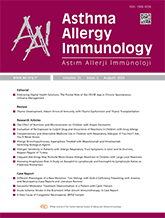


Objective: Allergic bronchopulmonary aspergillosis (ABPA) is a fungal infection commonly seen in patients with uncontrolled severe asthma. Standard treatment includes glucocorticoids and itraconazole; however, the use of biological agents such as omalizumab and mepolizumab has shown promise in patients unresponsive to conventional therapy. This study aims to share the clinical characteristics of ABPA patients who were uncontrolled with glucocorticoids and itraconazole and subsequently treated with mepolizumab or omalizumab.
Materials and Methods: Eight ABPA patients were included in this retrospective study. The diagnosis was made based on the criteria set by the International Society for Human and Animal Mycology (ISHAM). Clinical features, eosinophil levels, pulmonary function test results, disease stage, and treatment regimens were evaluated.
Results: Among the eight ABPA patients, three were female (37.5%) and five were male (62.5%). The mean age was 51.62 years (±8.73) with a range of 41 to 62 years. The average serum total IgE level at diagnosis was 1726 (±516) KU/L. All patients exhibited central bronchiectasis, and the serum eosinophil count ranged from 300 to 1670 cells/μL. Seven patients were positive for Aspergillus-specific IgE, while one patient tested negative for specific IgE but positive for IgG. Disease staging revealed that 62.5% were in stage 4, 25% were in stage 5b, and 12.5% were in the acute attack stage. All patients received high-dose inhaled corticosteroids, long-acting beta 2 agonists, and leukotriene receptor antagonists. Glucocorticoids and antifungal therapy were initiated in all patients, and omalizumab or mepolizumab was added to the treatment regimen due to drug side effects or inadequate asthma control. All patients initially received omalizumab, but four patients switched to mepolizumab later due to suboptimal asthma symptom control and exacerbations.
Conclusion: The standard treatment for ABPA involves glucocorticoids and itraconazole. However, when glucocorticoids cannot be discontinued or their side effects become problematic, monoclonal antibodies such as omalizumab or mepolizumab can be considered as alternative treatments.